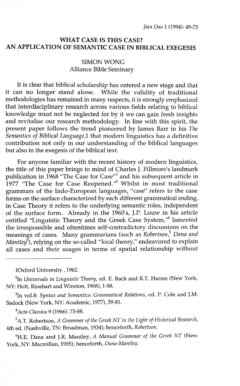What Case Is This Case? An Application Of Semantic Case In Biblical Exegesis(這是甚麼「格」?──「語意格」在釋經中的應用) / 黃錫木
撮要
本文依據一近代語言學理論「格的理論」(Case Theory)說明語意格(semantic case)能夠有效地研究希臘文的不同格(grammatical case)的各種語意功能。語意格的目的,並非將焦點放在不同變格詞尾(grammatical endings),而是有別於全面評估和重整文法格的不同用途,從而探討在一命題組合上的語意關係。由於這些語意關係已脫離了文法層面(即是語文的特殊性),我們可以將之轉換到不同的語言上。總而言之,所有語意格的本質,都可以變成以下一個問題:「在甚麼時候、甚麼地方、哪一個人以甚麼理由、爲了甚麼目的、基於甚麼緣故、向甚麼人做了甚麼?」確定這些語意格的重要性,在於不同的語意格可以不同的文法層面上表達出來。格的理論可以幫助讀者更能意識到兩組語意類別(Classes)上實體(Entities)及事情(Activities)的不同關係,而此實乃語意的關鍵部分。因此對語意的硏究有助於深入研經及翻譯的工作。
ABSTRACT
This paper applies a modern linguistic theory called Case Theory to demonstrate the usefulness of semantic case in the analysis and description of different grammatical cases of the Greek language. Because the focus of the semantic cases is not on the different usages of the grammatical endings (i.e. language specific), but the semantic relationship of different components of a proposition, which is language universal, one could readily transfer these semantic relationships across different languages. The nature of all the semantic cases may be summarized in the following question: “for what purpose does who do what to whom with what for what reason on what ground in what manner at what time at what place?” The importance of the study on semantic cases is that different cases may be represented by various and different grammatical components. Case Theory may help a reader to scrutize the different semantic relationship between the two semantic classes, namely. Entities and Activities, which are the two most intrigue elements in the study of meaning. For this reason, the study of semantic cases proves itself useful both in inter-lingual translation and exegesis.
原載於《建道學刊》1期(1994年1月),頁49-73。
最新文章
【新生見證】頃刻的呼聲 傾出一生回應 / 何能恩
2024 年 10 月 1 日
【新生見證】明燈指引 主愛綿延 / 容永進
2024 年 10 月 1 日
【新生見證】蒙召與回應 / 朱仲衡
2024 年 10 月 1 日
編輯精選
從梧州到長洲:建道神學院125年的挑戰與恩典 / 陳智衡
2023 年 10 月 1 日
微小教會的見證/高銘謙
2023 年 6 月 1 日







